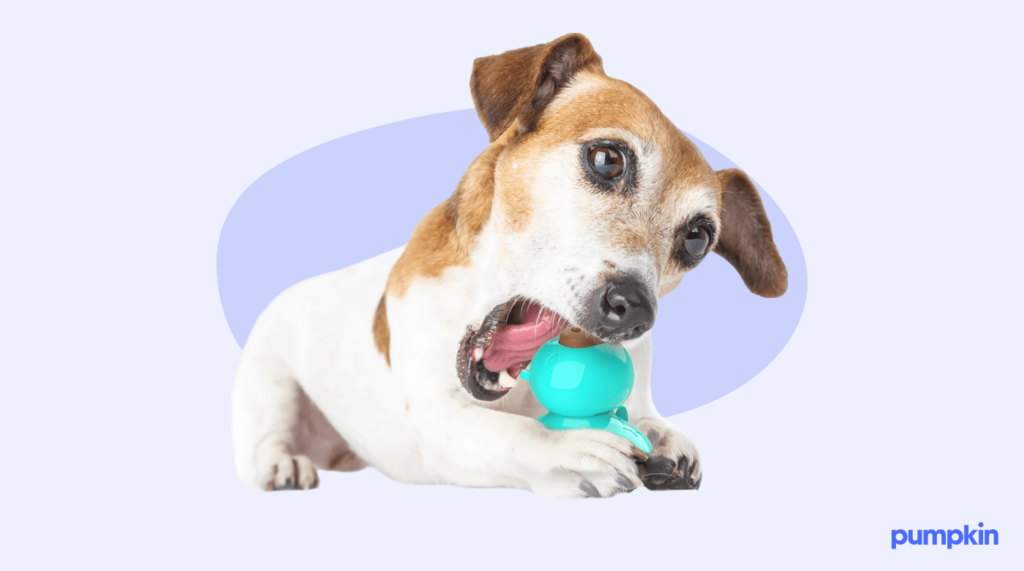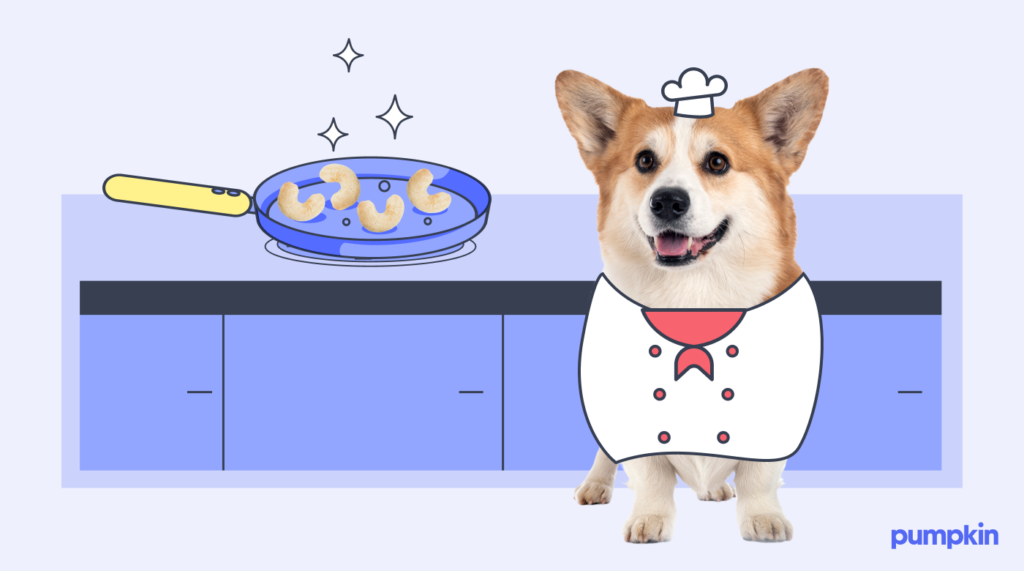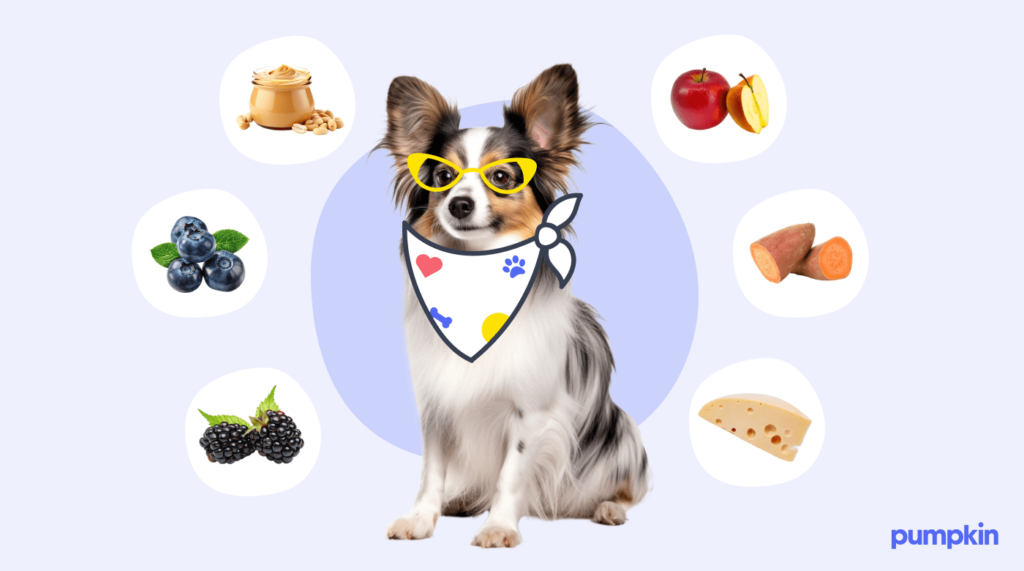Key Points
- Dogs can eat cashews in moderation, but they should be unsalted and not roasted in oil.
- Some dogs might not be fond of the taste or texture of cashews.
- Moderation is key when feeding cashews to dogs to avoid potential health issues.
When snacks are out, our beloved dogs are usually close by, watching attentively and hoping for a handout. And who doesn’t want to share snacks with their best friend?
If today’s snack is cashews, then your pup’s in luck. Cashews are a safe and healthy snack for dogs. They can eat raw or roasted cashews as long as they don’t contain added salt, seasonings, or oils. In fact, when prepared properly, dogs can eat plain cashews, cashew butter, and cashew milk as tasty, nutritious treats.
Read on to learn how to prepare cashews safely for your dog and a few small risks you should know about as a responsible pet parent.
Health benefits of cashews for dogs
Cashews are rich in proteins and essential minerals that can benefit your dog’s health. They contain heart-healthy fats and antioxidants, which can boost your dog’s immune system and overall health. For example, cashews are known for their omega-6 and omega-3 fatty acids, which help to control inflammation and can even make your dog’s coat shiny and soft.
While these nutrients are healthy for humans and dogs, your pup would need to eat a lot of cashews to reap these benefits, which isn’t recommended. Because of this, unsalted cashews should be considered more of a tasty treat than one with noticeable health benefits.
While cashews are safe, other nuts, like macadamia nuts, are toxic for dogs. It’s essential to research each nut type before offering it to your pet.
Always consult with your vet before introducing new treats to your dog’s diet.
Nutritional value of cashews for dogs
Cashews are rich in fiber, proteins, and heart-healthy fats. However, moderation is important when feeding them to your dog because these fats also make them high in calories.
Here’s the caloric breakdown for cashews, cashew milk, and cashew butter:
- One raw cashew contains about six to seven calories.
- One tablespoon (0.5 ounces) of homemade cashew milk contains 10 calories.
- One teaspoon (5 grams) of cashew butter contains about 31 calories.
By monitoring portion sizes, you can avoid overfeeding your pup and causing unnecessary weight gain. As a general rule, treats like cashews should make up no more than 10% of your dog’s daily diet.

Can dogs eat cashew butter and milk?
Yes, dogs can have cashew butter and cashew milk as well, as long as it doesn’t contain the harmful ingredients mentioned above, like salt and oils.
Moderation is still important here, as the high-fat content in cashews makes them high in calories.
Cashew butter, like other nut butters, is a great option to make a doggy treat go further, as it can be put into a dog toy like a KONG. Since cashew butter takes some time for dogs to lick up, just a little can go a long way in providing a fun and healthy snack. Sharing treats this way is very stimulating for dogs and engages them mentally and physically.
Can puppies eat cashews, too?
Yes, puppies can eat cashews, but it’s important to consider the choking hazard that nuts pose to small dogs. If you want to feed cashews to your puppy, chop them up into small pieces so they’re easier to eat. Better yet, stick to a small bit of cashew butter instead.
With puppies, moderation is even more important. Make sure to check out the appropriate serving size for your pup.
Risks of feeding cashews to dogs
It’s always a good idea to check with your vet before introducing a new food to their diet.
As with most people food, there are risks when feeding cashews to dogs, including:
High in fat
Veterinarian and journalist Dr. Sarah J. Wooten, DVM, CVJ told Pumpkin that these nuts are a high-fat snack and can do more harm than good to some pups. “Cashews are not a good treat for dogs that suffer from pancreatitis, hyperlipidemia, or recurrent gastroenteritis because they are high in fat, which can trigger these conditions. They are also not a good treat for dogs that are overweight, obese, or on a weight loss program.”
Overfeeding cashews can lead to weight gain and digestive issues, even in healthy dogs. In the worst case, excessive consumption can lead to pancreatitis.
Excess salt
Salted cashews contain excessive amounts of sodium, which can be harmful to dogs when consumed in large quantities. High sodium intake can lead to salt toxicity, causing symptoms like vomiting, diarrhea, weakness, muscle tremors, and seizures.
Choking
Cashews can pose a choking risk, especially for smaller dogs. It’s always best to monitor your dog when giving them any treat, including cashews, to prevent choking.
Cashew allergies
While rare, some dogs might be allergic to cashews. Symptoms include itching, swelling, and digestive issues like an upset stomach. If you notice any symptoms of an allergic reaction, stop feeding cashews and consult your vet.
How to feed cashews to dogs
With the variety of ways we eat cashews today, there are many options when it comes to feeding them to your dog:
- You can feed whole raw cashew nuts to your dog without seasonings or oils.
- Plain, roasted cashews are also safe for dogs. If you have a smaller dog, chop the cashews into small pieces to make them easier to eat and prevent choking.
- Add cashew butter to a dog toy for a brain-stimulating (and yummy) activity.
- You can also incorporate cashews into homemade dog treat recipes
The best types of cashews, cashew butter, and cashew milk to give to your dog are those you’ve prepared yourself. That way, you know they’re safe for your pup to consume.
How to make homemade cashew treats
By making your own cashew products and treats, you can better monitor the exact ingredients your dog is eating.
Here are some ways to safely prepare cashews for dogs to enjoy:
Roasted cashews recipe for dogs
This simple recipe from Culinary Hill can help you whip up some safe, pup-friendly cashews.
Start by preheating the oven to 350 degrees Fahrenheit. Line a baking sheet with foil or parchment paper and add the cashews on top, making sure none overlap.
Once the oven has preheated, place the tray inside it and allow them to roast, stirring once or twice, for 7 to 10 minutes or until browned.
Remove the tray from the oven and let the cashews cool completely before feeding them to your dog. When sealed in an airtight container, these cashews can last up to one week.

Cashew butter recipe for dogs
To make dog-safe cashew butter, all you need is roasted cashews and coconut oil. We found one simple recipe from Fit Mitten Kitchen to make a cashew butter that is tasty for both you and your dog.
To start, roast a cup of cashews on a lined baking tray in the oven at 350 degrees for 10 minutes. Then, allow them to cool in the pan for another 10 minutes.
Next, add the warm roasted cashews to a food processor and process them for about 10 minutes, pausing to scrape down the sides if necessary.
Once the cashews have become slightly creamy, keep the processor on while adding a small amount of honey (1-2 teaspoons, but less is more). Blend for another five minutes — or longer if you want a smoother consistency.
Homemade cashew butter can last up to 30 days when stored in the fridge.
Other dog-friendly “people food” snacks

There are many human foods that dogs can safely enjoy. Some of them include:
- Blueberries. Renowned for their antioxidant properties, blueberries are perfect training treats for dogs.
- Peanut butter. This is another dog-friendly nut butter; however, it’s important the peanut butter doesn’t contain xylitol, as this sweetener is highly toxic to dogs.
- Blackberries. Plain blackberries diced, smashed, or pureed into your dog’s bowl make for a healthy treat.
- Cheese. Dogs love cheese, and this cashew alternative is a no-brainer. But due to its high fat content, cheese should be given in moderation.
- Sweet potatoes. Full of vitamins, minerals, and fiber, sweet potatoes are a tasty snack for dogs when prepared properly.
- Apples. Apples are a great snack for dogs, as they’re full of fiber, vitamins, and minerals like calcium and potassium.
The verdict: Cashews are dog-safe treats
When it comes to sharing treats with our pups, it’s always best to err on the side of caution. While cashews can be a nutritious treat in moderation, always ensure they are prepared safely without added salts, oils, or seasonings.
As you explore feeding human food to your pet, having a dog insurance plan is a great way to ensure that your pup and your wallet are protected if something goes wrong. Pumpkin Pet Insurance plans can help you afford the best care by covering eligible vet bills for accidents and illnesses in the future.
- American Kennel Club. (2022, July 28). Can Dogs Eat Nuts? https://www.akc.org/expert-advice/nutrition/can-dogs-eat-nuts/
- American Kennel Club. (2023, February 7). How Many Treats Can Your Dog Really Have? https://www.akc.org/expert-advice/nutrition/how-many-treats-can-dog-have/
- Animal Medical Center of Chicago. (n.d.). Daily Calorie Requirements for Dogs. https://www.animalmedicalcenterofchicago.com/dog-diet-calorie-requirements-for-dogs/
- Healthline. (n.d.). 10 Nutrition and Health Benefits of Cashew Milk. https://www.healthline.com/nutrition/cashew-milk-benefits#TOC_TITLE_HDR_2
- Hexa Health (2024, January 2). Calories in 10 Cashews: Carbs, Nutrition Facts & Benefits. https://www.hexahealth.com/blog/calories-in-10-cashews
- Nutrients. (2010, June 24). Ros E. Health benefits of nut consumption. https://www.ncbi.nlm.nih.gov/pmc/articles/PMC3257681/
- Pet Poison Helpline. (n.d.). SODIUM TOXICITY SYMPTOMS IN PETS. https://www.petpoisonhelpline.com/pet-tips/sodium-toxicity-symptoms-in-pets/#
- San Diego Human Society. (2024, June 7). Enrichment: Kong Stuffing Pointers. https://resources.sdhumane.org/Resource_Center/Behavior_and_Training/Dogs_and_Puppies/Enrichment%3A_Brain_Games_for_Mental_Health/Enrichment%3A_Kong_Stuffing_Pointers
- U.S. Department of Agriculture (2019, April 1). Nuts, cashew butter, plain, without salt added. https://fdc.nal.usda.gov/fdc-app.html#/food-details/170163/nutrients




